How to Answer Law Exam Questions Effectively
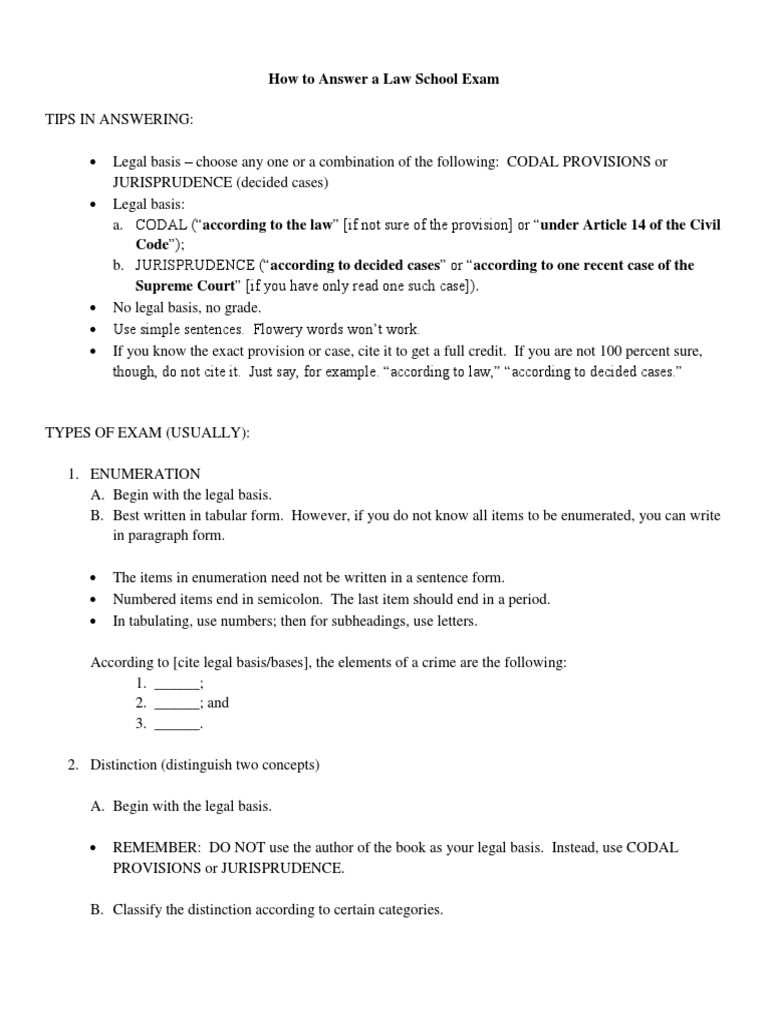
When facing assessments that require detailed written responses, it’s crucial to develop a clear, logical approach that ensures clarity and precision in your work. The process involves more than just recalling information; it requires careful thought, structured organization, and the ability to apply knowledge to specific scenarios effectively.
Understanding the task is the first step toward success. Rather than simply restating facts, your goal should be to demonstrate a comprehensive grasp of the subject and present your insights in a coherent manner. Precision in your wording and logical structure will significantly enhance the quality of your responses.
Effective preparation and practice are essential. By honing your ability to break down complex issues and present concise yet thorough arguments, you’ll be better equipped to tackle any challenge in a structured and confident way.
How to Approach Legal Written Assessments
Successfully tackling a written assessment in the field of law requires more than simply recalling information. It involves the ability to critically analyze scenarios, apply relevant principles, and present your argument in a structured manner. A well-organized response not only demonstrates your understanding but also ensures your points are communicated clearly and persuasively.
Key Steps to Success
- Read the Instructions Carefully – Take time to fully understand the requirements of the task. Identify the main issue and determine the legal areas you need to address.
- Structure Your Response Logically – Organize your thoughts before you begin writing. A clear introduction, followed by a detailed analysis, and a strong conclusion will guide your argument effectively.
- Apply Relevant Principles – Refer to statutes, case law, and established doctrines that directly relate to the topic at hand. This shows a solid grasp of the material.
- Stay Focused and Concise – Avoid unnecessary information that doesn’t directly contribute to solving the problem. Clarity is more important than elaboration.
Organizing Your Thought Process
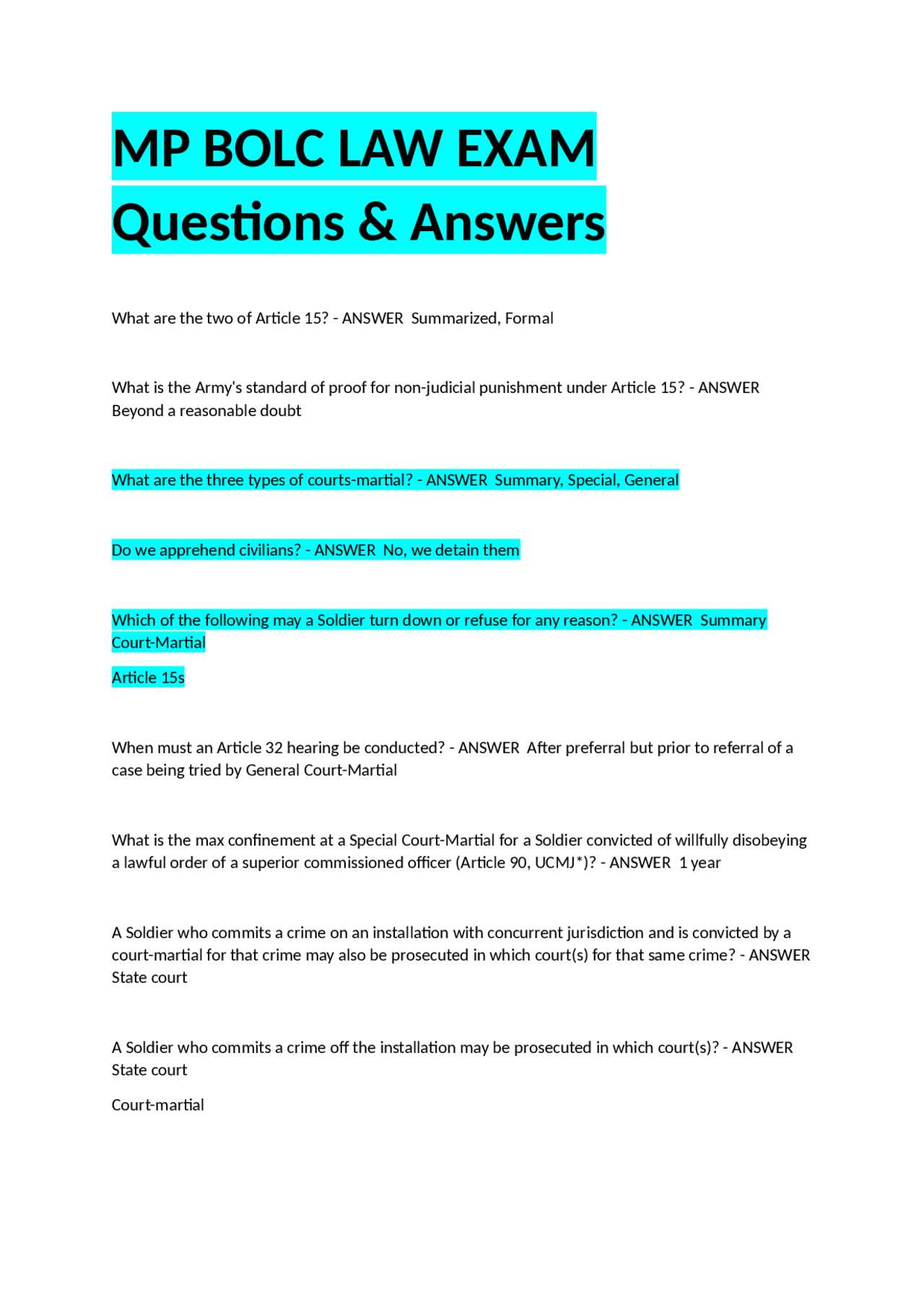
A critical step in crafting a coherent response is organizing your arguments. Start by breaking the issue into its components, addressing each part methodically. When discussing a case, identify the legal principles, analyze the facts, and apply them to the situation. It’s important to present each point logically and avoid jumping between unrelated ideas.
- Introduction: Provide a brief overview of the issue, outlining the key points you will address.
- Body: Discuss the relevant legal concepts, case law, and statutory provisions. Make sure to demonstrate the relationship between them and the issue.
- Conclusion: Summarize your findings and offer a final analysis or recommendation based on your discussion.
Understand the Question Before Responding
Before beginning any response, it’s crucial to first fully comprehend the task at hand. Taking time to carefully read and interpret the prompt ensures that you address all relevant aspects and avoid unnecessary detours. Misunderstanding the issue can lead to a misdirected argument and loss of valuable points.
Identify Key Issues
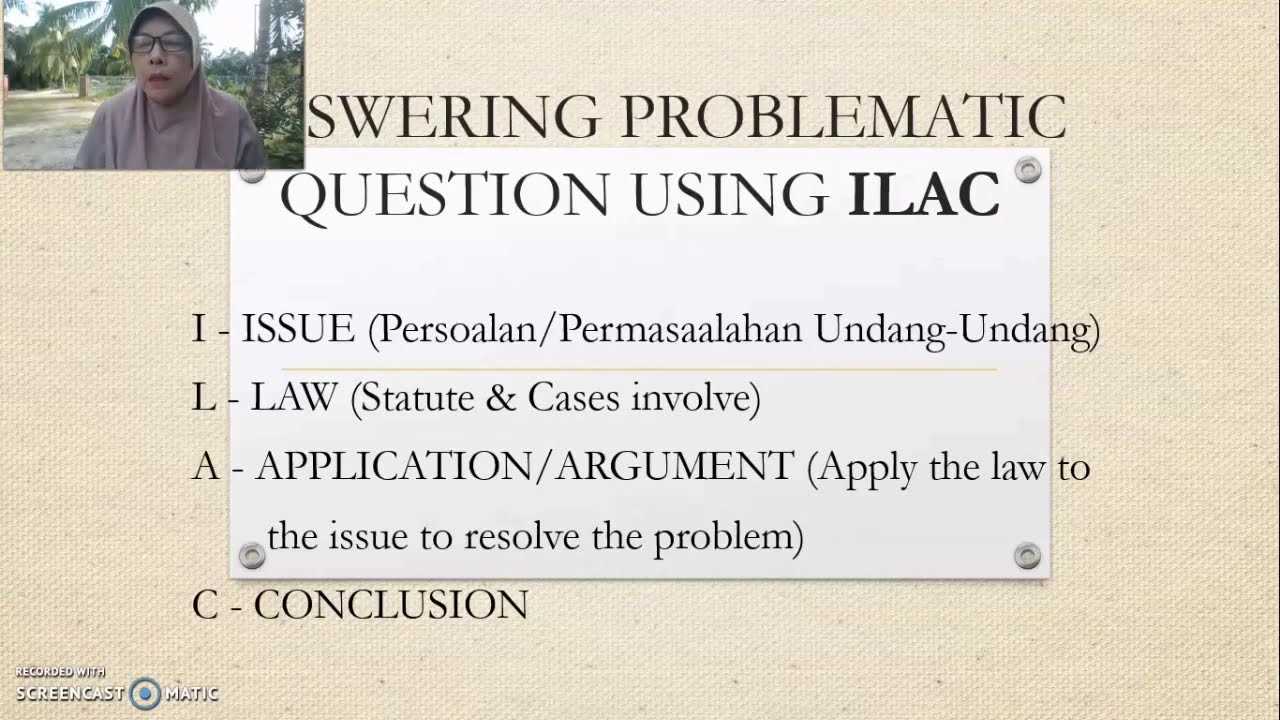
Carefully examine the wording of the prompt to identify the central issues. Look for terms that specify what needs to be addressed, whether it’s a specific legal concept, a scenario requiring analysis, or a question that demands a reasoned solution. Pay attention to any directives such as “explain,” “analyze,” or “evaluate” as they influence the structure of your response.
Break Down the Prompt
Take a moment to deconstruct the prompt into smaller, manageable components. If it involves a scenario, identify the facts, legal principles, and potential conflicts. This approach allows you to address each part systematically, ensuring that nothing is overlooked.
Break Down Complex Legal Problems
When faced with intricate scenarios or multifaceted issues, it is essential to break them into smaller, manageable parts. This approach enables you to identify the core elements and address each one systematically. By doing so, you ensure that every angle is considered and nothing is missed in your response.
Steps to Simplify Complex Issues

- Identify the central issue: Pinpoint the primary question or conflict in the scenario. This helps guide your analysis and ensures you stay focused on the most important aspects.
- Extract relevant facts: Gather all the key facts and details provided. Separate critical information from minor or unrelated details to avoid confusion.
- Analyze applicable principles: Consider the legal rules, doctrines, and precedents that are most relevant to the situation at hand.
- Divide the problem into sections: Break down the issue into smaller, logical components. Address each section separately, ensuring a thorough examination of all factors.
Organizing Your Response
Once the issue is broken down, structure your response clearly. Each part of the problem should be dealt with in turn, ensuring that your argument flows logically from one point to the next. This approach not only makes your answer easier to follow but also demonstrates a methodical and thorough understanding of the material.
Plan Your Response Strategically
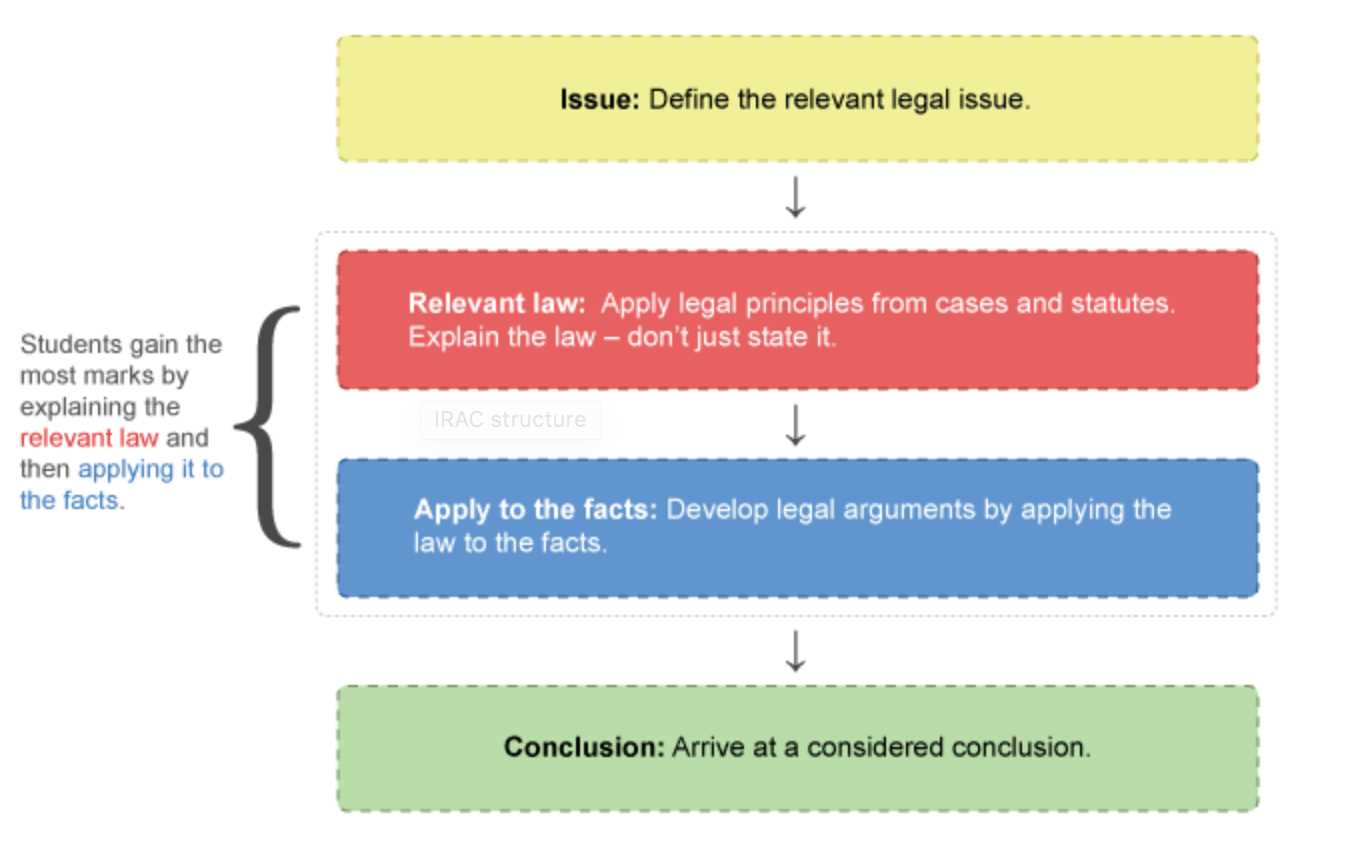
Before diving into writing, taking the time to plan your response can make a significant difference in the quality of your work. A well-structured plan allows you to organize your thoughts, prioritize key points, and ensure that each section of your response directly addresses the issue at hand. Strategic preparation helps you stay focused and avoids rambling.
Outline Your Approach
Start by outlining the main points you want to cover. Consider the most important elements of the prompt and how they should be addressed in a logical sequence. This will help you avoid missing critical aspects and ensure that your argument progresses in a clear and coherent manner. A good outline serves as a roadmap for your response.
Time Management
Effective planning also involves managing your time wisely. Allocate sufficient time for each section of your response–introduction, analysis, and conclusion–based on their complexity. This helps you avoid spending too much time on one part while neglecting others. A well-timed approach ensures that you can give each aspect the attention it deserves.
Structure Your Response Clearly
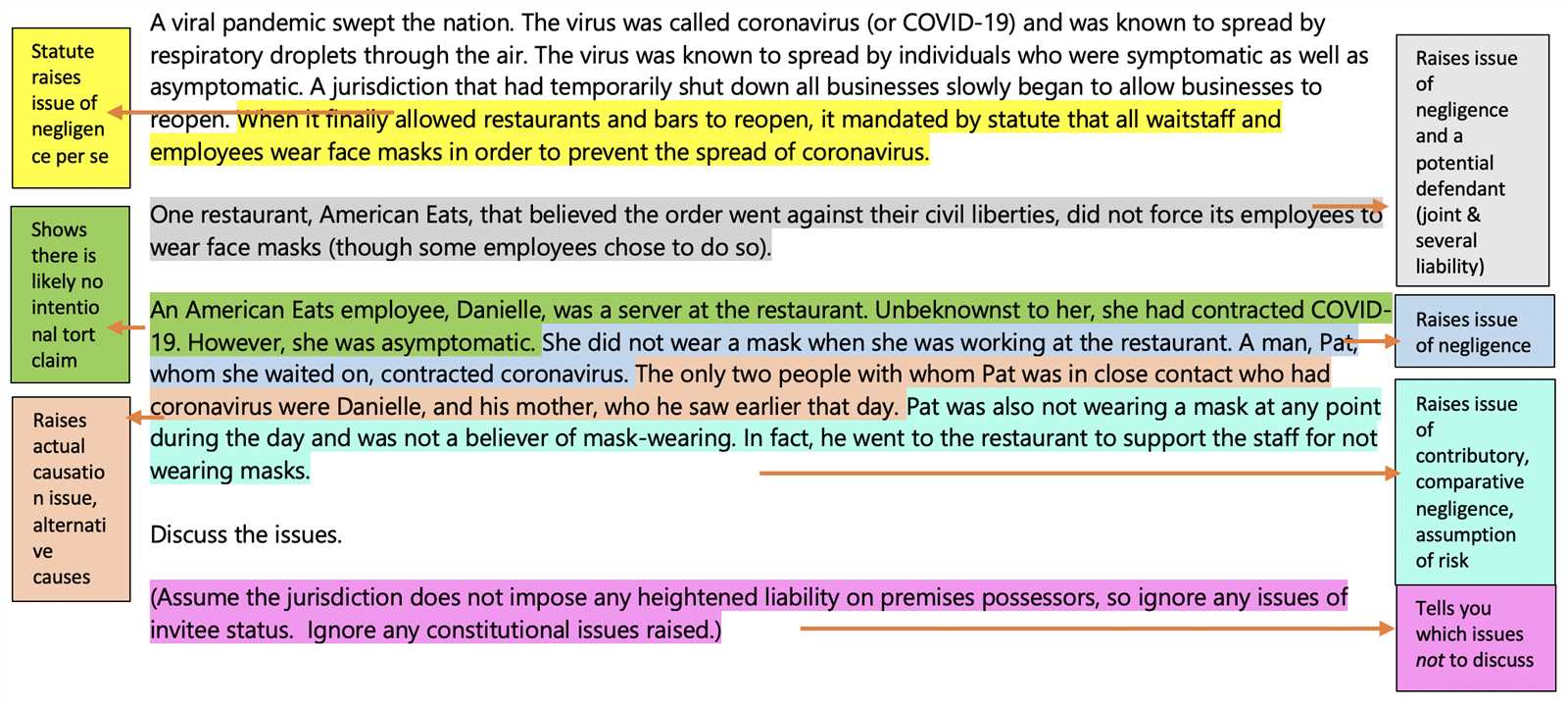
Clarity in your written response is crucial to effectively communicating your understanding and argument. A well-organized structure allows the reader to easily follow your reasoning and ensures that all points are addressed in a logical order. By presenting your ideas systematically, you highlight your analytical skills and ability to synthesize information.
The response should flow naturally from one point to the next, guiding the reader through your argument step by step. Start with an introduction that sets the stage, followed by a detailed analysis of the issues, and conclude with a clear resolution or summary of your findings. A structured response not only demonstrates a deep understanding but also enhances the overall readability of your work.
Use Legal Terminology Correctly
Using precise and accurate terminology is essential when discussing legal matters. The correct use of terms not only demonstrates your understanding of the subject but also strengthens your arguments and makes your response more authoritative. Misusing or incorrectly applying legal terms can undermine the quality of your work and confuse the reader.
Common Legal Terms and Their Usage
Here are some common legal terms and their proper usage in written assessments:
| Term | Meaning | Example |
|---|---|---|
| Precedent | A prior case or decision used as a standard in future similar cases. | “The court followed the precedent set in the previous ruling.” |
| Statute | A written law passed by a legislative body. | “The defendant was in violation of the statute governing property rights.” |
| Jurisdiction | The authority granted to a legal body to make decisions and judgments. | “The court lacked jurisdiction over the case due to its geographical location.” |
| Defendant | The individual or party being accused or sued in a court case. | “The defendant was found guilty of all charges.” |
| Plaintiff | The person or party who brings a case against another in a court of law. | “The plaintiff sought compensation for damages incurred.” |
Be Cautious with Complex Terms
While it’s important to use legal terms correctly, overuse or misuse of complex terms can make your response harder to understand. Aim for clarity and simplicity without sacrificing accuracy. If you’re unsure about the correct term, it’s better to use a simpler phrase that conveys the meaning accurately than to risk using a term incorrectly.
Focus on Key Legal Principles
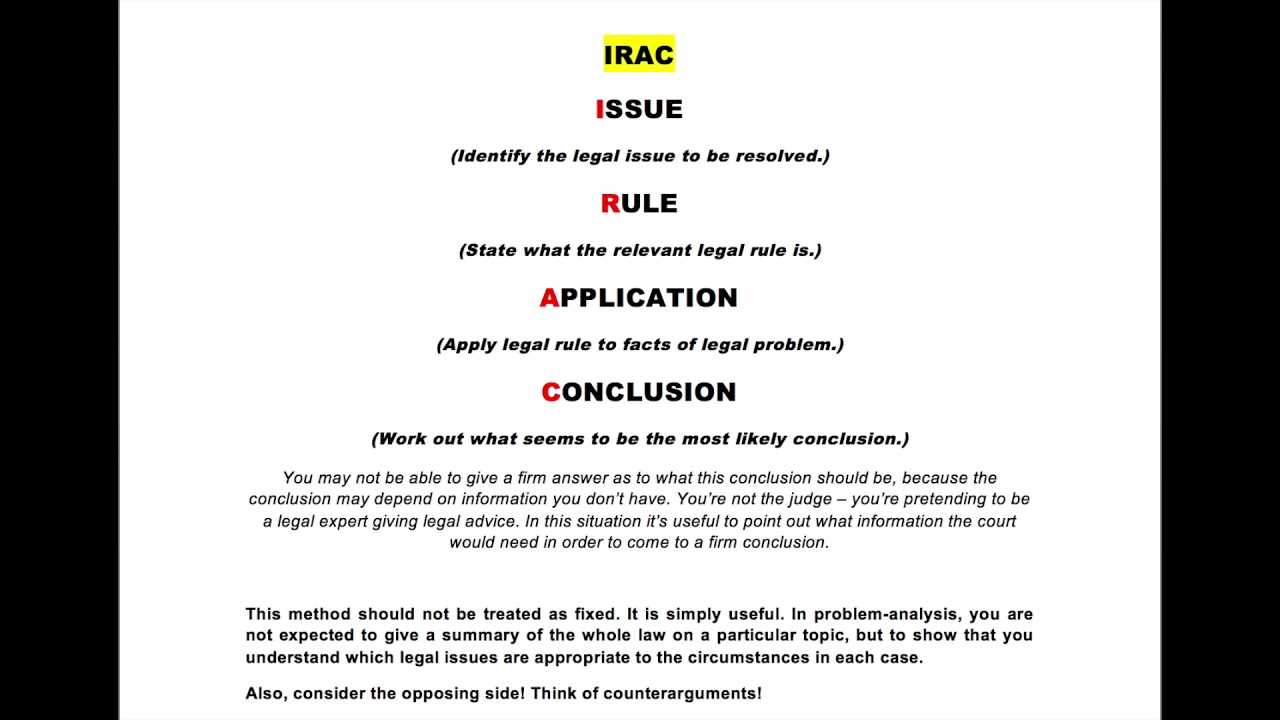
When tackling a written response, it’s crucial to focus on the core principles that are central to the issue at hand. These foundational concepts guide your analysis and provide the framework for your argument. By identifying and applying these principles, you ensure that your response is grounded in the relevant legal framework and demonstrates a clear understanding of the material.
Identifying the Core Principles
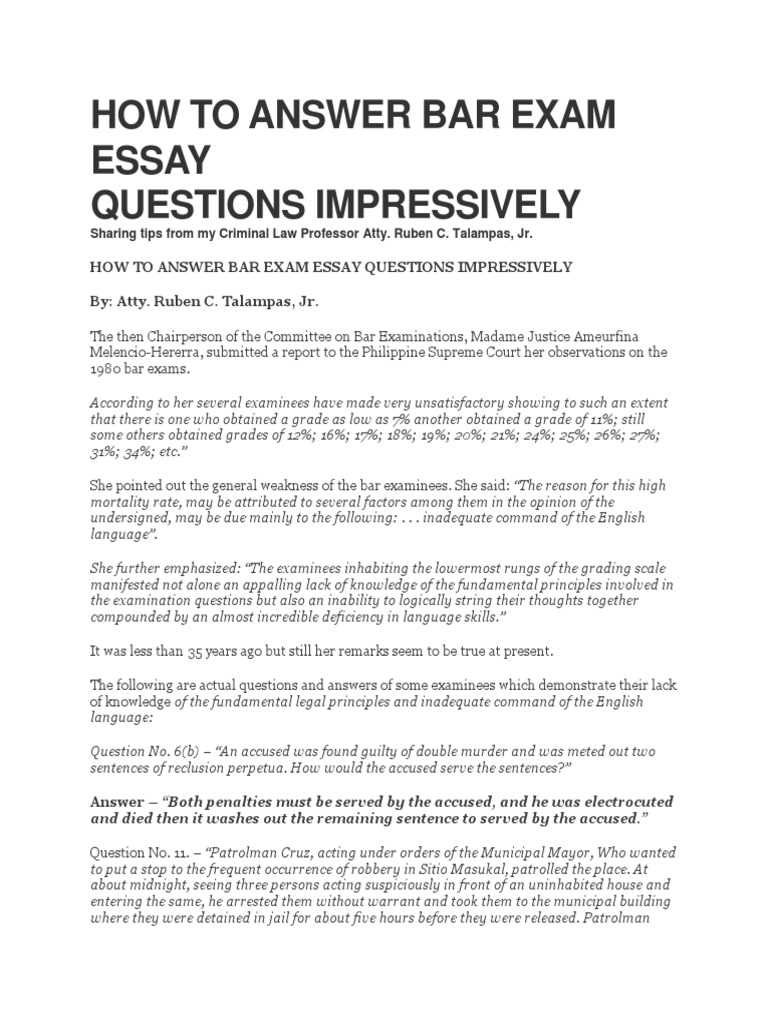
Start by recognizing the key doctrines or rules that apply to the scenario or problem presented. These could be statutory provisions, precedents, or general principles of justice that underpin the matter at hand. Highlighting these principles early in your response allows you to structure your argument around them and ensures your reasoning is sound and logical.
Apply Principles to the Case
Once identified, it’s important to apply these principles directly to the facts or issues within the scenario. Consider how each principle influences the situation and supports your conclusions. A strong analysis will not only reference the principles but also explain their relevance in the context of the problem, demonstrating how they guide the resolution of the issue.
Manage Your Time Effectively
Effective time management is essential for producing well-thought-out responses under time constraints. Allocating your time wisely allows you to address each part of the task thoroughly, ensuring that no important element is overlooked. By prioritizing your work and staying organized, you can enhance both the quality of your response and your overall efficiency.
One of the keys to managing time effectively is planning each phase of your work. From reading the prompt to drafting and reviewing your response, time should be divided thoughtfully to avoid rushing at the last minute. Establishing clear time limits for each section will help maintain focus and ensure that you complete the task within the available time frame.
Suggested Time Allocation
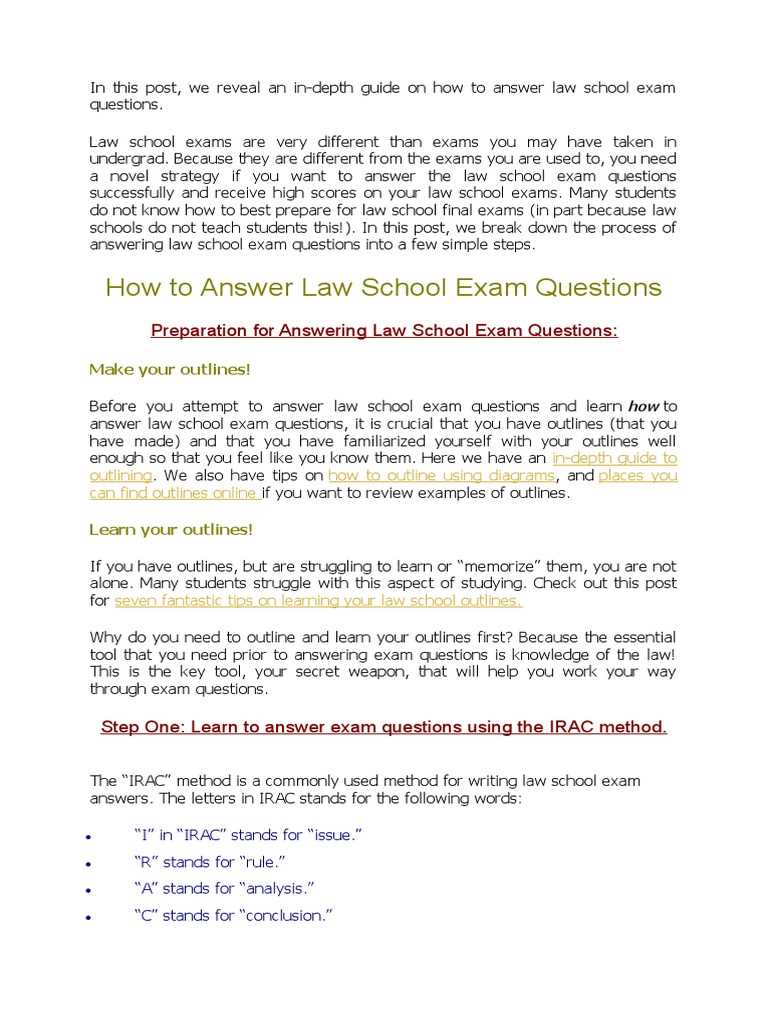
| Stage | Time Allocation | Action |
|---|---|---|
| Understanding the Task | 5-10 minutes | Read the prompt carefully and identify key issues. |
| Planning and Structuring | 10-15 minutes | Create an outline to organize your thoughts and approach. |
| Writing the Response | 30-40 minutes | Draft your response, focusing on clarity and logical flow. |
| Reviewing and Editing | 10-15 minutes | Proofread for errors and refine your argument. |
Adhering to a time management plan ensures that each part of the response receives the attention it deserves, allowing you to craft a more thorough and coherent answer.
Analyze Case Law Thoroughly
Understanding and applying relevant judicial decisions is crucial to constructing a well-supported argument. A thorough analysis of case law involves not just summarizing decisions but critically engaging with the reasoning behind them. By doing so, you can demonstrate your ability to synthesize legal precedents and apply them effectively to the given scenario.
When analyzing case law, focus on the key points of the judgment, including the legal principles established, how they were applied, and their relevance to the current issue. It’s important to highlight both the majority opinion and any dissenting views, as this provides a fuller picture of the legal landscape and strengthens your analysis.
Support Arguments with Evidence
Building a compelling argument requires more than just presenting your viewpoint; it necessitates backing up your claims with solid evidence. Whether it’s referencing statutes, judicial decisions, or relevant facts, providing concrete support lends credibility to your reasoning and demonstrates your understanding of the subject. Without evidence, your argument risks becoming weak or unsubstantiated.
To effectively support your arguments, identify the most relevant and authoritative sources that reinforce your position. Integrating case law, legal principles, or established facts ensures that your conclusions are grounded in accepted knowledge, making your response both persuasive and reliable. Always aim for precision and clarity when presenting evidence to avoid confusion or misinterpretation.
Highlight Relevant Statutory Provisions
When addressing a complex issue, referencing the appropriate legal texts is crucial for providing clarity and authority. Statutory provisions serve as the foundation for many arguments, outlining clear guidelines and rules that should be applied. Identifying and emphasizing these provisions ensures that your response is firmly rooted in the established legal framework, showing both understanding and thoroughness.
Understanding the Statute
Before incorporating a statute into your response, it is essential to understand its full scope and application. Carefully analyze the wording to determine which parts are directly relevant to the issue at hand. Highlight key sections that provide direct answers or clarifications, and explain their significance in relation to the facts or situation you are addressing.
Applying Statutory Provisions to the Case

Once the relevant statutory provisions are identified, demonstrate how they apply to the specific circumstances. Explain how these provisions shape the legal outcomes and provide the necessary framework for resolving the issue. This process not only strengthens your argument but also shows that you can effectively navigate and utilize statutory law to support your reasoning.
Avoid Irrelevant Information
In any response, it is essential to stay focused on the key issues and avoid introducing extraneous details. Including irrelevant information can confuse the reader, dilute your argument, and waste valuable time. By concentrating on what is directly related to the problem, you demonstrate clarity of thought and an ability to prioritize essential points.
Stick to the Core Issues
As you begin drafting your response, carefully identify the main issues presented. Make sure to address only those elements that are directly relevant to the topic at hand. Avoid discussing unrelated topics or offering unnecessary background information, as this can detract from the strength and focus of your argument.
Be Concise and Relevant
Every point you include should serve to advance your argument or provide clarity to the issue being discussed. When presenting evidence, legal principles, or case law, ensure that each reference is necessary for the analysis. This will make your response more concise and impactful, helping you stay within the time limits while maintaining high quality.
Write Concisely and Precisely

Effective writing requires the ability to communicate complex ideas in a clear and direct manner. Avoiding unnecessary words and focusing on essential details ensures that your response remains sharp and to the point. Precision in language reflects your understanding of the material and enhances the overall impact of your argument.
Each sentence should serve a specific purpose, providing either an explanation, evidence, or analysis. Strive for clarity by eliminating redundancies and avoiding overly elaborate language. This not only makes your writing more accessible but also ensures that your key points stand out, allowing the reader to easily follow your reasoning.
Show Critical Thinking in Your Response
Demonstrating analytical skills is crucial in any written assessment. It’s not enough to simply state facts or summarize material; you need to engage with the material critically. This involves evaluating arguments, considering alternative perspectives, and justifying your conclusions with solid reasoning. Critical thinking showcases your depth of understanding and your ability to apply concepts thoughtfully.
Evaluate and Question Assumptions
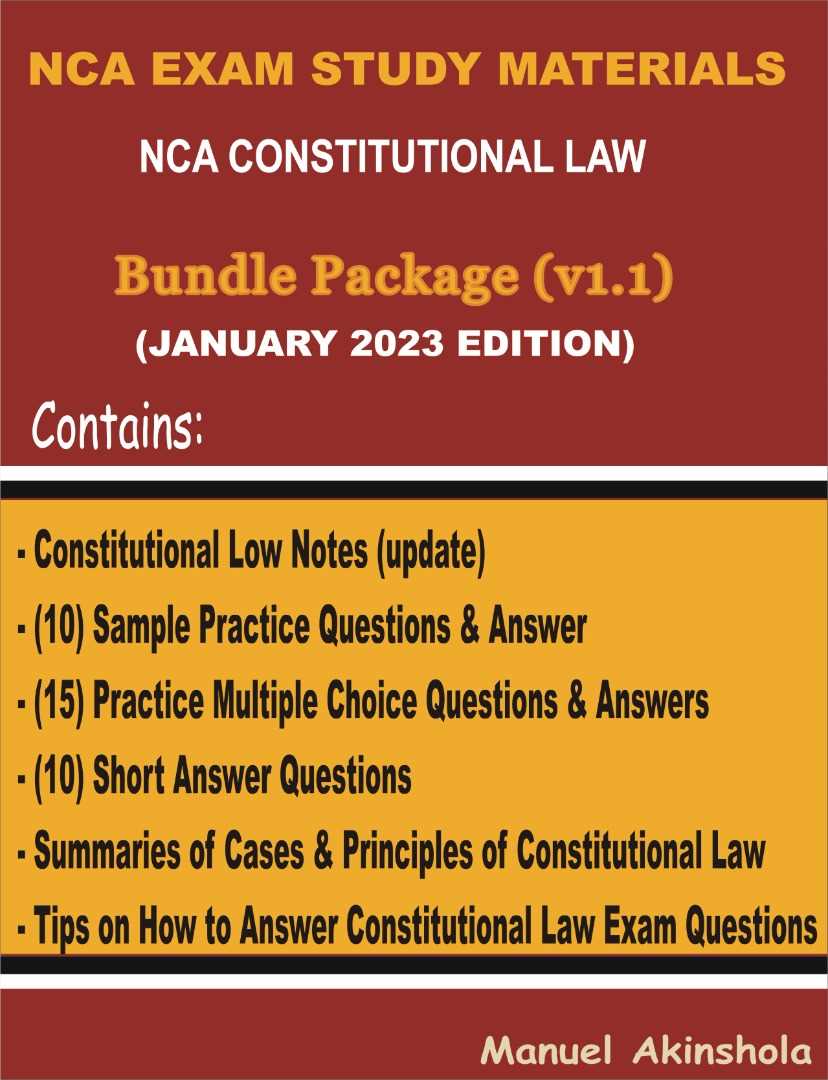
One key aspect of critical thinking is evaluating underlying assumptions. Be mindful of the premises upon which arguments are built and question whether they are valid. By critically examining these assumptions, you can uncover flaws in reasoning and offer a more nuanced response that goes beyond surface-level analysis.
Present a Well-Reasoned Argument
When presenting your viewpoint, always back it up with logical reasoning and evidence. Avoid jumping to conclusions without first considering the facts and potential implications. A well-reasoned argument is not just about making a claim; it’s about showing how that claim holds up when tested against available information and perspectives.
Use Practical Examples When Possible
Illustrating your points with relevant, real-world examples can make your response more persuasive and easier to understand. Examples provide concrete context, helping to bridge the gap between theory and practice. By demonstrating how concepts work in actual situations, you show a deeper understanding and enhance the credibility of your analysis.
Choose Relevant and Clear Examples
When selecting examples, ensure they are directly related to the issue at hand and effectively demonstrate the point you are making. Avoid overly complex scenarios that might confuse the reader. Instead, opt for clear and straightforward examples that are easy to follow and clearly illustrate the application of the concepts you’re discussing.
Show the Application of Theory
Practical examples allow you to show how theoretical concepts translate into real-world solutions or problems. By drawing from case studies, historical events, or hypothetical situations, you can strengthen your argument and demonstrate how abstract ideas are put into practice. This helps highlight your ability to apply knowledge in a meaningful way.
Review Your Response for Errors
Once you have completed your response, it’s essential to take time to carefully check your work for any mistakes or inconsistencies. Rushing through the review process may result in overlooked errors that could affect the clarity or accuracy of your argument. A thorough revision helps ensure that your points are clearly presented and free from unnecessary errors.
Check for Clarity and Consistency
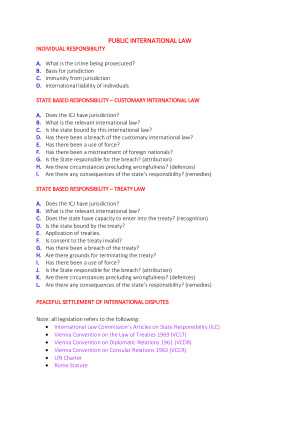
Ensure that your ideas flow logically and that each part of your response connects clearly to the next. Look for any ambiguous or unclear statements that might confuse the reader. Consistency is also key–verify that you’ve used terminology accurately and consistently throughout the response to avoid contradictions.
Correct Grammatical and Typographical Mistakes
Grammatical and typographical errors can undermine the professionalism of your response. Carefully proofread for spelling mistakes, punctuation errors, and sentence structure issues. Even minor errors can detract from the overall quality of your work and may give an impression of carelessness.
Stay Calm and Confident During Exams
Maintaining composure and self-assurance during testing situations is crucial for performing at your best. Stress and anxiety can cloud your judgment and hinder your ability to think clearly. By staying calm and confident, you enhance your ability to approach each task methodically and focus on presenting your ideas clearly and logically.
Practice Relaxation Techniques
Before and during the test, take a moment to breathe deeply and stay grounded. Relaxation techniques, such as deep breathing or visualization, can help reduce anxiety and bring clarity to your thoughts. It’s important to stay present and not be overwhelmed by the situation.
Trust Your Preparation

Confidence comes from preparation. Trust that the effort you’ve put into studying will pay off. Even if you encounter unexpected challenges, rely on your knowledge and skills to find solutions. Confidence in your abilities helps you stay focused and efficient, allowing you to manage the test with a clear mind.
- Take deep breaths when feeling stressed.
- Stay positive and focused on your strengths.
- Break tasks into smaller, manageable steps.